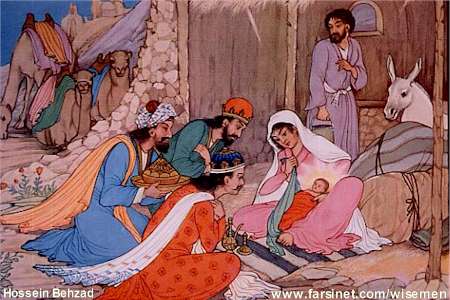Please refer to the source for more information.
http://www.farsinet.com/wisemen/magi.html
Magi (Majusian)
 From old Persian language, a priest of Zarathustra (Zoroaster). The Bible gives us the direction, East and the legend states that the wise men were from Persia (Iran) - Balthasar, Melchior, Caspar - thus being priests of Zarathustra religion, the mages. Obviously the pilgrimage had some religious significance for these men, otherwise they would not have taken the trouble and risk of travelling so far. But what was it? An astrological phenomenon, the Star?
From old Persian language, a priest of Zarathustra (Zoroaster). The Bible gives us the direction, East and the legend states that the wise men were from Persia (Iran) - Balthasar, Melchior, Caspar - thus being priests of Zarathustra religion, the mages. Obviously the pilgrimage had some religious significance for these men, otherwise they would not have taken the trouble and risk of travelling so far. But what was it? An astrological phenomenon, the Star? - Matthew 2:1 - "After Jesus was born in Bethlehem in Judea, during the time of King Herod, Magi [*] from the east came to Jerusalem." (* Footnote: Traditionally Wise Men). Matthew 2:7 - Then Herod called the Magi secretly and found out from them the exact time the star had appeared. Matthew 2:16 - When Herod realized that he had been outwitted by the Magi, he was furious, and he gave orders to kill all the boys in Bethlehem and its vicinity who were two years old and under, in accordance with the time he had learned from the Magi.
- Church of Nativity in Bethlehem, was erected in 329 by Queen Helena in the area it was believed to be where Jesus was born. In 614, The Church was saved from destruction by the Persian rampage because of the mosaic of the Magi dressed in Persian Garb on the floor of this church.
- Magi, priestly caste in ancient Persia. They are thought to have been followers of Zoroaster, the Persian teacher and prophet, and they professed the doctrines of Zoroastrianism. By the 1st century AD, the magi were identified with wise men and soothsayers. Encarta Concise Encyclopedia - Religion & Philosophy.
Information on the church converted from a temple by the wise man in Urumia
To whom it may concern,Salam. I am a Bangladeshi doctor who worked in Iran under Ministry of Health from 1985 to 94. During my stay in Iran I travelled many areas-having archeological importance. The ancient churches of Iran was also included in my interest. Once on the way to the Ghara Kilisha I was in Urumia. In the city I had a chance of visiting one church. I have forgetten the name of the chuch but the thing which I still remember that there were two chuches in the same compound, One was recent made and the ancient one was under the ground. May be this was an assurian church. I was told by a local person that the ancient structure was not a church, rather it was a Zorostrian temple. One of the 3 wisemen who visited new born Jesus was a Zorostrian Priest who after the crucifixation started practising Christianity & converted the temple to the christian church. At that time videography was mamnoo in Iran so I could not do any videography.
I am interested to know more regarding the church and want to verify from your organization about the authenticity whatever I was told. Please let me know about your opinion. Please do reply.
Dr. N. D. R. - worked in Kerman Province
If you have any information in this regard to share with Dr. R. please send to webmaster@farsinet.com
From Chapter XI (Of the province of Persia) of Marco Polo's "The Travels; The Description of the world" written in 1298. This translation is by William Marsden, revised by Thomas Wright (Konemann Travel Classics, Koln, Germany, 1996).
Persia was anciently a large and noble province, but it is now in great part destroyed by the Tartars. In Persia there is a city which is called Saba, from whence were the three magi who came to adore Christ in Bethlehem; and the three are buried in that city in a fair sepulchre, and they are all three entire with their beards and hair. One was called Baldasar, the second Gaspar, and the third Melchior.
Marco inquired often in that city concerning the three magi, and nobody could tell him anything about them, except that the three magi were buried there in ancient times. After three days' journey you come to a castle which is called Palasata, which means the castle of the fire-worshippers, and it is true that the inhabitants of that castle worship fire, and this is given as the reason.
The men of that castle say, that anciently three kings of that country went to adore a certain king who was newly born, and carried with them three offerings, namely, gold, frankincense, and myrth: gold, that they might know if he were an earthly king; frankincense, that they might know if he were God; and myrth, that they might now if he were a mortal man.
When these magi were presented to Christ, the youngest of the three adored him first, and it appeared to him that Christ was of his stature and age. The middle one came next, and then the eldest, and to each he seemed to be of their own stature and age. Having compared their observations together, they agreed to go all to worship at once, and then he appeared to them all of his true age.
When they went away, the infant gave them a closed box, which they carried with them for several days, and then becoming curious to see what he had given them, they opened the box and found in it a stone, which was intended for a sign that they should remain firm as a stone in the faith they had received from him.
When, however, they saw the stone, they marvelled, and thinking themselves deluded, they threw the stone into a certain pit, and instantly fire burst forth in the pit. When they saw this, they repented bitterly of what they had done, and taking some of the fire with them they carried it home.
And having placed it in one of their churches, they keep it continually burning, and adore that fire as a god, and make all their sacrifices with it; and if it happen to be extinguished, they go for more to the original fire in the pit where they threw the stone, which is never extinguished, and they take of none other fire. And, therefore, the people of the country worship fire.
Marco was told all this by the people of the country; and it is true that one of those kings was of Saba; and the second was Dyava, and the third was of the castle.
Please send your comments and suggestions to webmaster@farsinet.com
Copyright © 1996-2009 FarsiNet Inc. All Rights Reserved. (100198 472687 )
--
Posted By Andry Chang to FireHeart - Exploring Worlds of Fantasy at 12/04/2009 02:46:00 PM





No comments:
Post a Comment